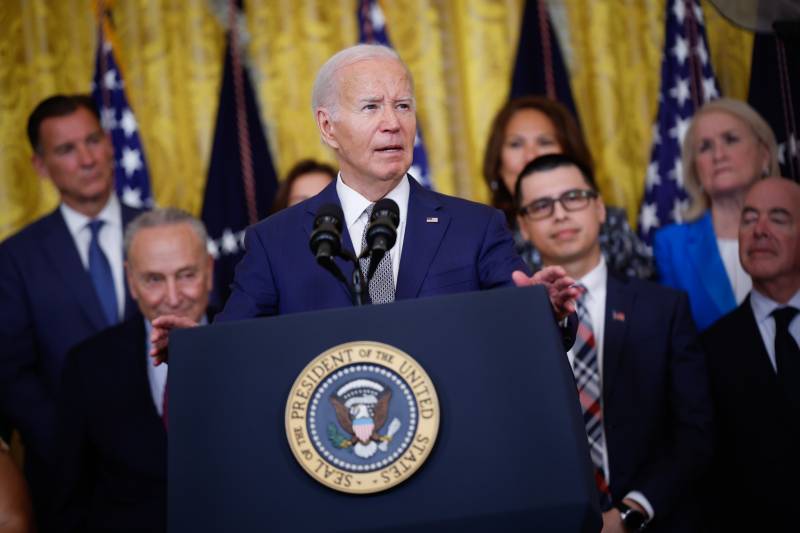“When this was announced, it was like a huge sigh of relief,” said Mayra Alvarez, president of The Children’s Partnership, a nonprofit children’s advocacy organization based in Los Angeles. “The opportunity that families are going to be able to stay together as they apply for permanent residency is a direct commitment to child well-being. It’s an acknowledgment that parents and caregivers are critical to children’s healthy development.”
Some research shows that the fear of deportation of a parent or caregiver impacts children’s ability to do well in school.
“Absenteeism, repeating a grade and dropping out are all more likely” for children who have an undocumented parent, said Carolyn Sattin-Bajaj, associate professor of education at UC Santa Barbara. She added that undocumented parents are also less likely to apply for public programs for which their U.S. citizen children are eligible, like Head Start, food stamps and public health insurance.
Modesto resident Mirna Cisneros, whose husband and three children are U.S. citizens, said she was elated when she learned about the new policy.
“Imagine, I even cried when I found out,” Cisneros said in Spanish. Still, she said she won’t truly believe it until she is actually able to apply for permanent residency.
Cisneros came to the U.S. from Mexico in 1999 when she was 17. She met her husband in Florida and later moved with him to California. Though her husband is a U.S. citizen, she has not been able to obtain permanent residency through him. She was going to apply but stopped the process after realizing that she would have to return to Mexico and might have to stay there for 10 years.
Cisneros said her three children, who are 17, 16 and 11 years old and are also U.S. citizens, have told her many times they are afraid she will be deported. She said her middle son told her, “’Mamá, I’m always thinking about what will happen if they grab you and take you to Mexico. I’m going to miss you. What will happen if we can’t see you?’”
If she gets permanent residency, she said, it would allow her to work in better-paying jobs to help support her family. She currently bakes and decorates cakes from her home.
Being able to apply for permanent residency would also give her children more flexibility and freedom to choose where they want to attend college, Cisneros said. Her oldest daughter is set to graduate from high school next year and has told her she wants to attend college out of state, in Florida, but because Cisneros avoids traveling by plane because of her immigration status, her daughter has been planning to give up that dream to attend school closer to home.
“We know that as soon as they’re able to get a work permit and have the stability of knowing that they’re not going to be deported, that parent will be able to access better employment. That will mean better salaries, better types of jobs that allow parents to be more engaged in their children’s schooling, and that’s going to lead to mental and physical health benefits for parents and children,” said Wendy Cervantes, director of immigration and immigrant families at the Center for Law and Social Policy (CLASP). The nonprofit organization was one of two dozen groups that sent a letter to the Biden administration in May asking for the change in policy.
Cervantes pointed to research about how children benefited when their parents received work permits and protection from deportation through the Deferred Action for Childhood Arrivals (DACA) program, introduced by then-President Barack Obama in 2012 that has allowed hundreds of thousands of people who were brought to the United States as children to temporarily remain in the country and obtain work permits. In one study, children whose mothers were eligible for the deferral program had 50% fewer diagnoses of adjustment and anxiety disorders.
However, Sattin-Bajaj expressed concern that many immigrants may be hesitant to apply because of the upcoming presidential election and the uncertainty of whether such a policy would be maintained under a new administration, particularly if led by former President Donald Trump.
“I don’t have a lot of confidence that there’s euphoria right now because things move so slowly, and it feels like a storm is brewing,” Sattin-Bajaj said.
Top Republican leaders have rejected the program. Karoline Leavitt, the Trump campaign national press secretary, issued a statement saying, “Biden only cares about one thing — power — and that’s why he is giving mass amnesty and citizenship to hundreds of thousands of illegals who he knows will ultimately vote for him and the Open Border Democrat Party.”
Those who qualify for the new program would not be able to vote until they receive citizenship, and they would not be able to apply for citizenship until three years after they get permanent residency.
Speaker of the House Mike Johnson issued a statement saying he expects the program to be challenged in court and accused President Joe Biden of trying to “play both sides.”
